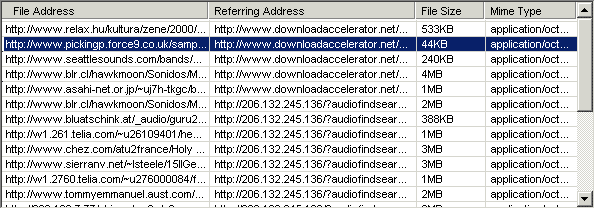For example if you search for the band named "U2", you will probably get the following result:

As you can see in the example above, the result is the location of the file you were looking for and some additional details.
Files can be located on any server on the Internet from "www.download.com" to "www.geocities.com".
In this way you are no longer depended on the slow and busy bandwidth of private computers,
also you no longer need to pray they stay online while you download the file.
URLBlaze directs you to stable and powerful servers where you can download the files you need.
To deliver the best results URLBlaze harness the power of its online users as well as the power of many major search engines over the net. URLBlaze verifies every http link received by any search engines before delivering it to you, so there is no way that http links you found arenÆt there.
The URLBlaze network idea, was inspired by the idea behind Gnutella. Like Gnutella, URLBlaze is anonymous.
One of the problems with Napster and others like it is that they are centralized. A centralized place
for government agencies to impinge upon your freedom to search the net. All those commercial realtime
search engines probably keep logs so they can target ads at you. At least they keep logs so they know
how many searches they get per day so they can tell it to their investors. And they probably run some
data mining to figure out how many people searched for MP3's, how many people searched for recipes, etc.
All that so they can figure out exactly what their customer is like.
URLBlaze puts a stop to all those shenanigans. When you send a query to the URLBlaze Network,
there is not much in it that can link that query to you. We are not saying it's totally impossible
to figure out who's searching for what, but it's pretty unlikely, and each time your query is passed,
the possibility of discovering who originated that query is reduced exponentially.